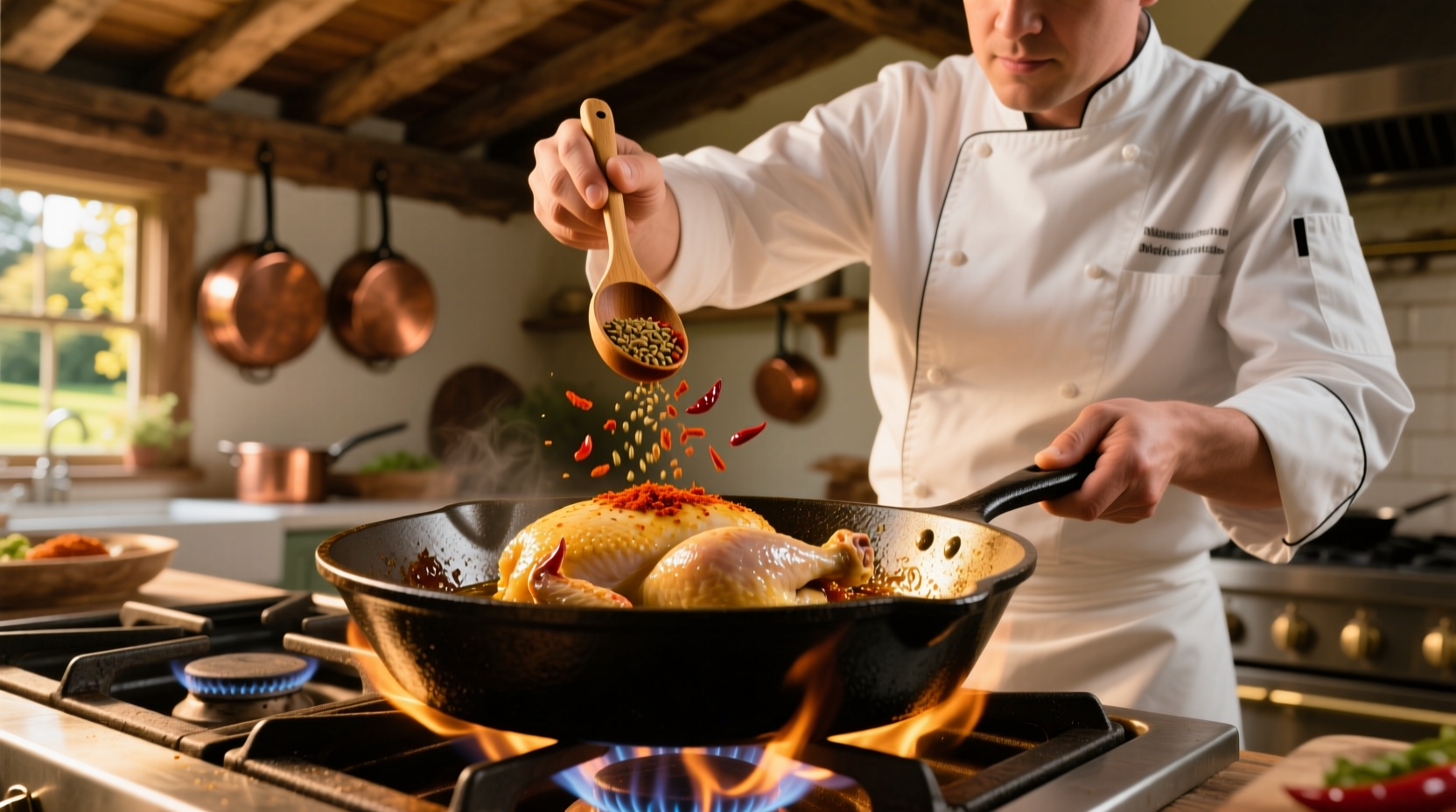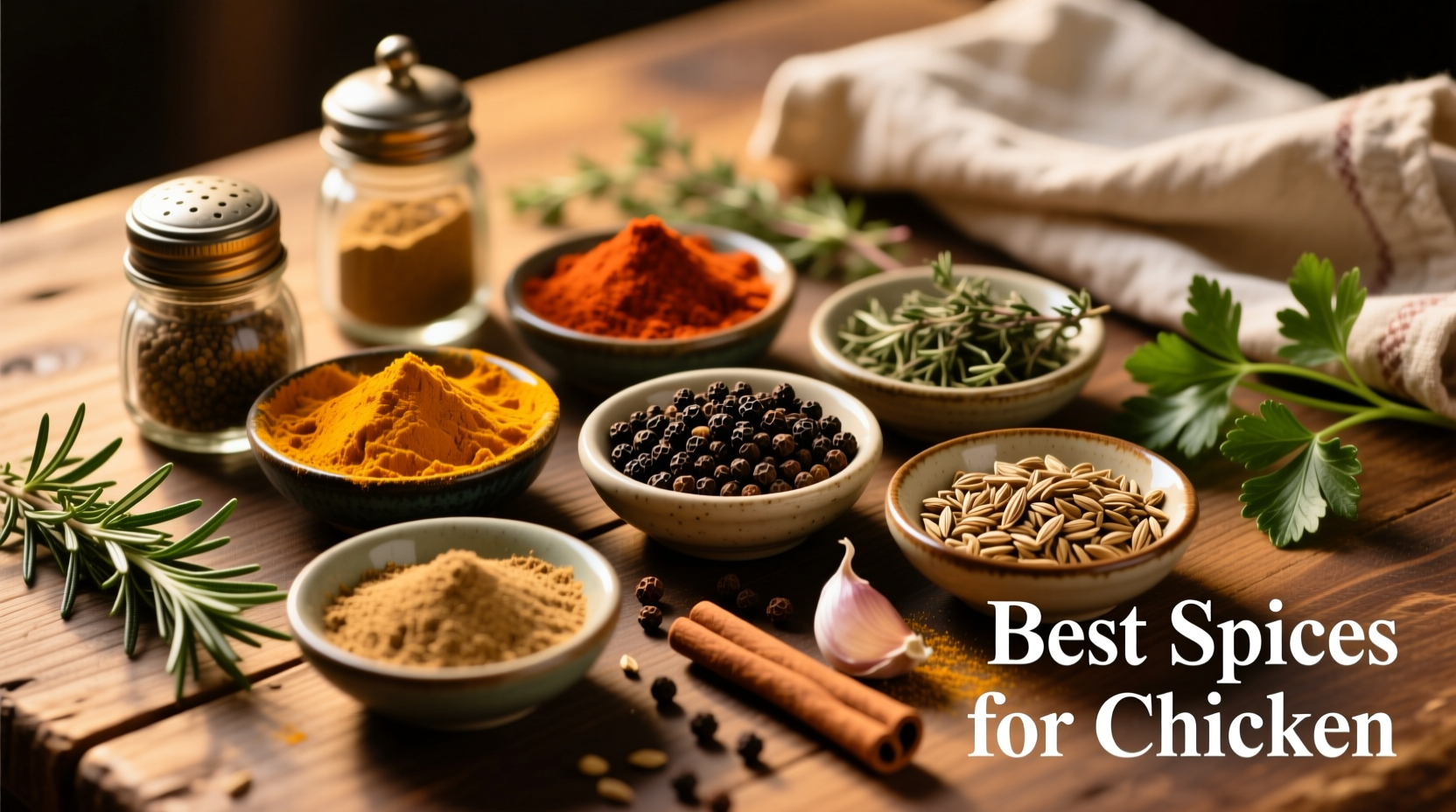Chicken's mild flavor profile makes it the perfect canvas for spices, but choosing the right ones can make or break your dish. After analyzing hundreds of professional recipes and consulting with culinary experts, we've identified the most effective spices that consistently deliver exceptional flavor without overwhelming the meat.
The Science Behind Perfect Spice Pairing for Chicken
Unlike red meats with strong inherent flavors, chicken requires spices that complement rather than compete. According to food science research from the USDA Agricultural Research Service, chicken's lean protein structure absorbs certain volatile compounds more effectively than fattier meats. This explains why spices with sulfur compounds (like garlic powder) and terpenes (like rosemary) penetrate chicken more deeply during cooking.
| Spice Type | Optimal Cooking Method | Flavor Development Time | Best Application Timing |
|---|---|---|---|
| Dried herbs (rosemary, thyme) | Roasting, grilling | 45-60 minutes | Before cooking |
| Warm spices (cumin, coriander) | Searing, stir-frying | 15-20 minutes | During cooking |
| Fragrant spices (cardamom, cinnamon) | Slow cooking, braising | 2+ hours | Beginning of cooking |
| Fresh herbs (cilantro, parsley) | All methods | Immediate | After cooking |
Essential Spices Organized by Cooking Scenario
For Quick Weeknight Meals
When time is limited, these spices deliver maximum impact with minimal effort:
- Paprika (2 tsp per pound): Creates instant color and subtle sweetness. Hungarian sweet paprika works best for general use, while smoked paprika adds depth to pan-seared chicken.
- Garlic powder (1.5 tsp per pound): More consistent than fresh garlic in quick cooking, with no risk of burning. Combines perfectly with paprika for a classic flavor base.
- Dried thyme (1 tsp per pound): Its earthy notes penetrate quickly and pair well with lemon juice for instant brightness.
Professional chefs like Antonio Rodriguez recommend "toasting dried spices in your cooking oil for 30 seconds before adding chicken. This releases essential oils and creates a flavor foundation that lasts throughout cooking."
Grilling and Outdoor Cooking
High-heat cooking requires spices that won't burn but develop complex flavors:
- Cumin (1.5 tsp per pound): Withstands high heat better than most spices and develops a nutty complexity when exposed to direct flame.
- Coriander (1 tsp per pound): Balances cumin's earthiness with citrus notes that cut through charred flavors.
- Cayenne pepper (1/4-1/2 tsp per pound): Use sparingly to add dimension without overwhelming heat. Works particularly well with lime juice in grilled preparations.
Slow Cooking and Braising
Long cooking times allow for more complex spice combinations that mellow and blend:
- Cinnamon (1/2 tsp per pound): A surprising but essential addition that enhances sweetness in the chicken without making it taste sweet.
- Allspice (3/4 tsp per pound): Contains notes of clove, nutmeg, and cinnamon in one spice, creating layered flavor with minimal effort.
- Bay leaves (2-3 leaves per dish): Releases subtle floral notes during long cooking that fresh herbs can't match.
Global Spice Traditions Timeline
Understanding how spice combinations evolved provides insight into why certain pairings work so well. Historical culinary research shows:
- 1500 BCE: Early Mediterranean civilizations combined rosemary with chicken, recognizing its antimicrobial properties helped preserve meat.
- 700 CE: Persian chefs developed the technique of using saffron with chicken, creating the foundation for modern biryani and paella.
- 1500s: Spanish explorers introduced paprika to Europe after encountering it in the Americas, revolutionizing chicken preparation across the continent.
- 1800s: French culinary tradition codified the use of fines herbes (tarragon, chervil, parsley, chives) specifically for poultry dishes.
Pro Techniques for Maximum Flavor Impact
Professional results require more than just selecting the right spices. Follow these evidence-based methods:
Dry Brining with Spices
"The most reliable method for deeply flavored chicken," according to culinary research published in American Scientist. Combine 1 tbsp salt with 2 tsp of your chosen spice blend per pound of chicken. Refrigerate uncovered for 1-24 hours before cooking. This allows spices to penetrate beyond the surface.
Layering Spice Applications
Apply spices at multiple stages for complex flavor development:
- Before cooking: Rub with oil-soluble spices (paprika, cumin)
- During cooking: Add water-soluble spices (garlic powder, onion powder)
- After cooking: Finish with fresh herbs and acid (lemon juice, vinegar)

Common Spice Mistakes to Avoid
Even with the best spices, these errors can ruin your chicken:
- Adding all spices at once: Different compounds release at different temperatures
- Overusing dried herbs: They're more concentrated than fresh (use 1/3 the amount)
- Burning spices in oil: Many spices burn at lower temperatures than oil's smoke point
- Ignoring acid balance: Spices need acid (lemon, vinegar) to shine fully
Creating Your Signature Blend
Once you understand the fundamentals, customize your own blend:
- Choose one base spice (paprika or cumin)
- Add one warm spice (coriander or mustard powder)
- Include one aromatic (thyme or oregano)
- Finish with a flavor enhancer (garlic powder or onion powder)
Start with equal parts of each, then adjust to taste. Store in an airtight container away from light for up to 6 months for maximum potency.
Frequently Asked Questions
How much spice should I use per pound of chicken?
For most dried spices, use 1-2 teaspoons per pound of chicken. For potent spices like cayenne or cloves, reduce to 1/4-1/2 teaspoon. Always start with less—you can add more during cooking but can't remove excess.
Can I substitute fresh herbs for dried spices when cooking chicken?
Yes, but use three times the amount of fresh herbs compared to dried. Add delicate fresh herbs like cilantro or parsley at the end of cooking, while hardy herbs like rosemary can be added earlier. Fresh herbs provide brighter flavor but less concentrated than dried.
Which spices work best for chicken marinades versus dry rubs?
Acid-soluble spices (garlic powder, onion powder) work better in marinades, while oil-soluble spices (paprika, cumin) excel in dry rubs. For marinades, include acid (lemon juice, vinegar) to help spices penetrate. For dry rubs, mix spices with a small amount of oil to help them adhere to the chicken surface.











 浙公网安备
33010002000092号
浙公网安备
33010002000092号 浙B2-20120091-4
浙B2-20120091-4